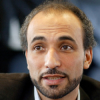Tariq Ramadan

Tariq Ramadan
Tariq Ramadanis a Swiss academic, philosopher and writer. He is the professor of Contemporary Islamic Studies in the Faculty of Oriental Studies at St Antony's College, Oxford and also teaches at the Oxford Faculty of Theology. He is a visiting professor at the Faculty of Islamic Studies, the Université Mundiapolisand several other universities around world. He is also a senior research fellow at Doshisha University. He is the director of the Research Centre of Islamic Legislation and Ethics, based in...
NationalitySwiss
ProfessionWriter
Date of Birth26 August 1962
CountrySwitzerland
Culture constitutes an essential element of social and political liberation. As people rise up across the Middle East and North Africa, the diversity of their cultures is not only the means but also the ultimate goal of their liberation and their freedom.
The diversity is the risk of war, the necessity of diversity is mutual respect
Religious symbols should be visible in public space, in a dignified and non-provocative manner. Christmas trees here, Jewish menorahs there and, further along, a minaret - these symbols represent human life in all its diversity.
The universality of Islam is not uniformity, it is unity with diversity.
Discomfort levels in our societies are rising, or so it would seem. In theory, we invoke diversity and tolerance. But in real life, we raise our hackles and withdraw into ourselves.
"If we had not created a set of people against another the world would have been corrupt", and "against" here means two things: Against in the fact that they are challenging you with their diversity, challenging your intelligence and to challenge is not negative, it can be very positive depending on how you are challenged.
It's clear there is nothing in my record supporting terrorism.
We all cherish freedom of speech, but with a reasonable approach and a reasonable use of it. If we come to this, it is a debate. If not, then it is a power struggle. Who is going to win, the Muslim principles or the Western principles?
I've never suffered because of my heritage in Europe.
Many U.S. organizations believe that I am being barred from the country not because of my actions but because of my ideas. The conclusion seems inescapable.
We've got to get away from the idea that scholars in the Islamic world can do our thinking for us. We need to start thinking for ourselves.
The rich stick together; the poor and the marginalised are thrown together.
The world is a complex place, and the influence of the media in its representation and its power of communication and interpretation is a remarkable amplifier of emotions, and of illusions.
Cultures, along with the religions that shape and nurture them, are value systems, sets of traditions and habits clustered around one or several languages, producing meaning: for the self, for the here and now, for the community, for life.